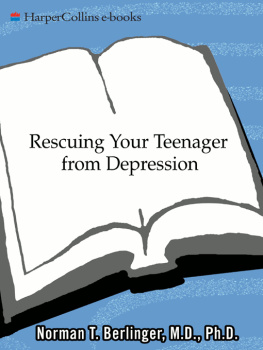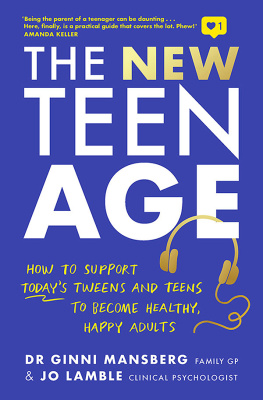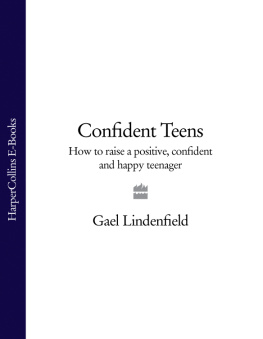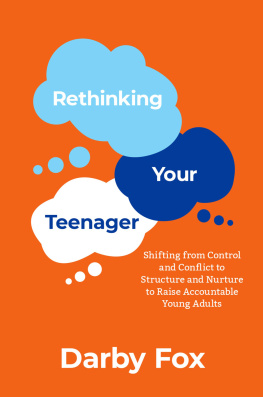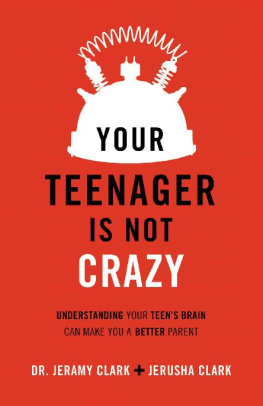how to really
parent
YOUR TEENAGER
Raising Balanced Teens in an Unbalanced World
Ross Campbell, M.D.
WITH ROB SUGGS

Copyright 2006 by Ross Campbell
All rights reserved. No portion of this book may be reproduced, stored in aretrieval system, or transmitted in any form or by any meanselectronic, mechanical, photocopy, recording, or any otherexcept for brief quotation in printed reviews, without the prior permission of the publisher.
Published by W Publishing Group, a Division of Thomas Nelson, Inc., P.O. Box141000, Nashville, Tennessee 37214.
W Publishing Group books may be purchased in bulk for educational, business,fund-raising, or sales promotional use. For information, please e-mail SpecialMarkets@ThomasNelson.com.
All Scripture quotations, unless otherwise indicated, are taken from the HolyBible, New International Version (NIV). Copyright 1973, 1978, 1984 by International Bible Society. Used by permission of Zondervan Bible Publishers.
All rights reserved.
Scripture quotations noted NKJV are from The New King James Version, copyright 1979, 1980, 1982 by Thomas Nelson, Inc., Publishers.
Library of Congress Cataloging-in-Publication Data
Campbell, Ross, 1936
How to really parent your teenager : raising balanced teens in an unbalanced world / Ross Campbell, with Rob Suggs.
p. cm.
Includes bibliographical references.
ISBN 0-8499-454
1. Parenting-Religious aspects-Christianity. 2. Child rearing-Religious aspects-Christianity. 3. Parent and teenager-Religious aspects-Christianity. I. Suggs, Rob. II. Title.
BV4529.C365 2006
248.845dc22
2005035028
Printed in the United States of America
06 07 08 09 10 RRD 8 7 6 5 4 3 2 1
contents
N EVER HAS THERE BEEN A MORE EXCITING-OR MORE challenging-era in which to be (or parent) a teenager. The benefits of living in todays global society are great, but so are the dangers. Across the nation pregnancies, sexually transmitted diseases, abortion, drug use, homicide, and suicide have all become commonplace among teens.
But despite these facts, moms and dads continue to have a dramatic impact on their children. Research shows that parents-not peers-exert the most significant influence in the life of a teen. I deeply believe that the most important impact on the teenagers mood and choices is parental love. Without a sense of parental love, teenagers are more prone to be swept along by the contemporary currents of confusion. In contrast, teenagers who genuinely feel loved by their parents are far more likely to respond to the deep longings for community; to welcome structure; to respond positively to guidelines; and to find purpose and meaning in life. Nothing holds morepotential for positively changing Western culture than parental love.
If the teenagers emotional need for love is met, it will profoundly affect the behavior of the teenager. At the root of much teenage misbehavior is the teens empty love tank. I am not suggesting that parents do not love their teenagers; I am suggesting that thousands of teenagers do not feel that love. For most parents it is not a matter of sincerity but rather a lack of information on how to effectively communicate love on an emotional level. Dr. Campbell has helped hundreds of thousands of parents learn how to do this effectively. This book provides for a new generation of parents the insights and skills necessary for effectivelymeeting the teenagers need for emotional love.
Learning how to process anger in a positive way is a second vital area in which the teenager needs parental influence. Every teenager experiences anger. Unfortunately, some never learn how to respond constructively to the heated emotion of anger. These are the teenagers who eventually commit acts of violence about which we read in the daily news. The successful parent must find a way to help the teenager learn to process anger constructively. For those parents who neve learned to handle their own anger, this can be a formidable challenge.
As a psychiatrist with more than thirty years experience working with troubled teens and their parents, Dr. Ross Campbell is uniquely qualified to write on the subject of anger management. In How to Really Parent Your Teenager, Dr. Campbell gives parents the insights necessary to understand teenage anger and a plan for helping teenagers learn how to control their anger rather than being controled by it,
Keeping your teenagers emotional love tank full and helping him or her learn how to manage anger constructively are the foundational stones for successful parenting of teenagers in the twenty-first century. If these two foundation stones are in place, the other aspects of parenting teens will seem like cream on top of the cake. Without these two foundations, the cake will crumble. In How to Really Parent Your Teenager, Dr. Campbell gives contemporary parents the recipe for successfully baking the cake and enjoying the cream.
Gary D. Chapman, PhD.
Author, The Five Love Languages
President, Marriage & Family Life Consultants, Inc.
Winston-Salem, North Carolina
www.garychapman.org
1
a stranger in the house
O NE MORE LONG DAY IS OVER. YOU CRAWL UNDER THE BED covers to claim a few hours of rest-one of lifes pleasant little rewards. Today youve earned it.
As you click off the lights, your thoughts settle into the comfort of darkness and wander sleepily through the current events of your life. The pace is manageable just now. Bills are paid; plans are progressing; kids are healthy.
Still, a spark of anxiety flickers in the back of your mind. It prevents your calm descent into slumber. Thats the parental intuition light, blinking to tell you there is unfinished business somewhere in your family life. Best to ignore it. Think too much about those things and you wont sleep-and that would be unfair to the full day tomorrow.
But you do know what its all about, dont you? Its something in the air-audible, actually. The faint sound of music creeps down the hall and through your bedroom door. The melody is muffled by earphones, almost unnoticeable. But the rattle of hiphop percussion is audible in the midnight stillness.
That would be your teenager.
When does he ever sleep, other than at wake-up time in the morning? Aw, well-so much for your own slumber. Now these thoughts cant be blotted out. You sit up and sigh.
Teenager. That word alone evokes so many different feelings and questions. You turn the lights back on and allow your thoughts to come forward and speak.
The first thought asks, Where did the time go? It almost seems as if you went to the hospital one day, brought home your newborn, filled the photo album with pictures of your new family-and already your child was moving rapidly through grade school. Life accelerated in fast-forward mode. His infanthood, toddlerhood, and early childhood slipped from your loving arms far too quickly, one after the other, though you enjoyed each new age and stage. The funny thing about it is that in adult time, only a short season has passed. (For the sake of this illustration, well consider your child a male this time.) You look, think, and feel mostly the same way you did a decade and a half ago. That same brief period has represented a lifetime for your child. It was exciting when he learned to walk. You were thrilled when conversation became possible. Starting kindergarten was a wonderful day.
That was the first thought. Another one steps forward to ask, Where did my sweet child go? All too well you remember a happy, carefree toddler, trying for all he was worth to manage two halting steps across the floor. Or learn the nuances of speech. Or play well with others. Every day was an adventure for your son-but an adventure you shared together.
Next page



